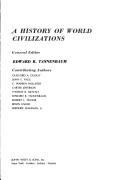| Listing 1 - 10 of 350 | << page >> |
Sort by
|
Book
ISBN: 9232025124 9789232025128 Year: 1990
Abstract | Keywords | Export | Availability | Bookmark
 Loading...
Loading...Choose an application
- Reference Manager
- EndNote
- RefWorks (Direct export to RefWorks)
316.7 --- #SBIB:39A1 --- Antropologie: algemeen --- Politique culturelle. --- Politique culturelle --- Décennie mondiale du développement culturel, 1988-1997. --- Diffusion culturelle. --- études comparatives. --- Politique culturelle. Prévision. 1988-1997. --- Culturele politiek. Vooruitzicht. 1988-1997.

ISBN: 1281875287 9786611875282 1426484399 Year: 2007 Publisher: [Place of publication not identified] BiblioBazaar
Abstract | Keywords | Export | Availability | Bookmark
 Loading...
Loading...Choose an application
- Reference Manager
- EndNote
- RefWorks (Direct export to RefWorks)
This early work by Francis Sydney Marvin was originally published in 1921 and we are now republishing it with a brand new introductory biography. 'Recent Developments in European Thought' is a work on the historical changes that have shaped modern Europe. Francis Sidney Marvin was born in 1863, in London, son of Francis Bentham Marvin and his wife Julia Chase. He was educated at Merchant Taylors School in London and went on to study lassics and modern history at St. John's College, Oxford. Marvin retained a keen interest in history throughout his life and organised many courses and lectures on the subject to promote interest in the field. He wrote several notable works, including Progress and History (1924), The Evolution of World-Peace (1933), and The leadership of the world (1914). Francis Sidney Marvin died in 1943, in Barnet, at the age of eighty.
Civilization. --- Barbarism --- Civilisation --- Auxiliary sciences of history --- Culture --- World Decade for Cultural Development, 1988-1997
Book
ISBN: 0804785376 9780804785372 9780804782760 0804782768 Year: 2013 Publisher: Stanford Stanford University Press
Abstract | Keywords | Export | Availability | Bookmark
 Loading...
Loading...Choose an application
- Reference Manager
- EndNote
- RefWorks (Direct export to RefWorks)
Barbarism and civilization form one of the oldest and most rigid oppositions in Western history. According to this dichotomy, barbarism functions as the negative standard through which "civilization" fosters its self-definition and superiority by labeling others "barbarians." Since the 1990's, and especially since 9/11, these terms have become increasingly popular in Western political and cultural rhetoric—a rhetoric that divides the world into forces of good and evil. This study intervenes in this recent trend and interrogates contemporary and historical uses of barbarism, arguing that barbarism also has a disruptive, insurgent potential. Boletsi recasts barbarism as a productive concept, finding that it is a common thread in works of literature, art, and theory. By dislodging barbarism from its conventional contexts, this book reclaims barbarism's edge and proposes it as a useful theoretical tool.
Civilization. --- Barbarism --- Civilisation --- Auxiliary sciences of history --- Culture --- World Decade for Cultural Development, 1988-1997 --- Civilization
Book
ISBN: 9783030991043 Year: 2022 Publisher: Cham Springer International Publishing :Imprint: Palgrave Macmillan
Abstract | Keywords | Export | Availability | Bookmark
 Loading...
Loading...Choose an application
- Reference Manager
- EndNote
- RefWorks (Direct export to RefWorks)
Civilization. --- Barbarism --- Civilisation --- Auxiliary sciences of history --- Culture --- World Decade for Cultural Development, 1988-1997
Book
ISBN: 3030991032 3030991040 Year: 2022 Publisher: Cham, Switzerland : Springer,
Abstract | Keywords | Export | Availability | Bookmark
 Loading...
Loading...Choose an application
- Reference Manager
- EndNote
- RefWorks (Direct export to RefWorks)
Civilization. --- Barbarism --- Civilisation --- Auxiliary sciences of history --- Culture --- World Decade for Cultural Development, 1988-1997
Book
ISBN: 3737011680 384711168X Year: 2021 Publisher: Göttingen : V&R unipress,
Abstract | Keywords | Export | Availability | Bookmark
 Loading...
Loading...Choose an application
- Reference Manager
- EndNote
- RefWorks (Direct export to RefWorks)
"This volume analyzes historical processes of mobility by focusing on material objects. Mobility--as a shorthand for various related processes such as migration, transfer, entanglement, and translation--involves human actors, immaterial elements such as ideas and knowledge, but also objects in various forms and functions. For example, as material infrastructures they are the basis for transport and travel; as goods they are the object and purpose of trade or gift exchange. By focusing on the way objects determined certain processes of mobility and how their social meaning and materiality was transformed in these processes, the contributors hope to gain deeper insight into the historical relations between the Ottoman Empire, Eastern Europe, and Persia"--Back cover.
Civilization. --- Barbarism --- Civilisation --- Auxiliary sciences of history --- Culture --- World Decade for Cultural Development, 1988-1997

ISBN: 0471844802 Year: 1973 Publisher: New York (N.Y.) : Wiley,
Abstract | Keywords | Export | Availability | Bookmark
 Loading...
Loading...Choose an application
- Reference Manager
- EndNote
- RefWorks (Direct export to RefWorks)
Civilization --- -Barbarism --- Civilisation --- Auxiliary sciences of history --- Culture --- World Decade for Cultural Development, 1988-1997 --- History --- History. --- -History --- Cultural history
Periodical
ISSN: 18423043 Year: 2006 Publisher: Iașa : Editura Universitații Alexandru Ioan Cuza" Iași,
Abstract | Keywords | Export | Availability | Bookmark
 Loading...
Loading...Choose an application
- Reference Manager
- EndNote
- RefWorks (Direct export to RefWorks)
Civilization --- Christian civilization --- Civilization, Christian --- Barbarism --- Civilisation --- Christianity --- Auxiliary sciences of history --- Culture --- World Decade for Cultural Development, 1988-1997
Book
ISBN: 1283436256 1443834378 9786613436252 9781443834377 9781283436250 1443833762 9781443833769 6613436259 Year: 2011 Publisher: Newcastle upon Tyne Cambridge Scholars
Abstract | Keywords | Export | Availability | Bookmark
 Loading...
Loading...Choose an application
- Reference Manager
- EndNote
- RefWorks (Direct export to RefWorks)
Humankind has always striven to catch a glimpse of the future. Egyptian priests, Babylonian astrologers, Greek oracles and medieval magicians stared at the sky and tried to foresee the coming catastrophes, relying on certain distributions of the stars. Co
Forecasting. --- Civilization. --- Barbarism --- Civilisation --- Auxiliary sciences of history --- Culture --- World Decade for Cultural Development, 1988-1997 --- Forecasts --- Futurology --- Prediction
Book
ISBN: 1134947917 1280109920 9786610109920 0203407776 0203323513 9780203323519 Year: 1995 Publisher: London New York Routledge
Abstract | Keywords | Export | Availability | Bookmark
 Loading...
Loading...Choose an application
- Reference Manager
- EndNote
- RefWorks (Direct export to RefWorks)
This clear and thought-provoking examination of the years from Queen Victoria's accession to the close of the century, pays particular attention to the post-1875 period.
Great Britain --- History --- Civilization. --- Barbarism --- Civilisation --- Auxiliary sciences of history --- Culture --- World Decade for Cultural Development, 1988-1997
| Listing 1 - 10 of 350 | << page >> |
Sort by
|

 Search
Search Feedback
Feedback About UniCat
About UniCat  Help
Help News
News